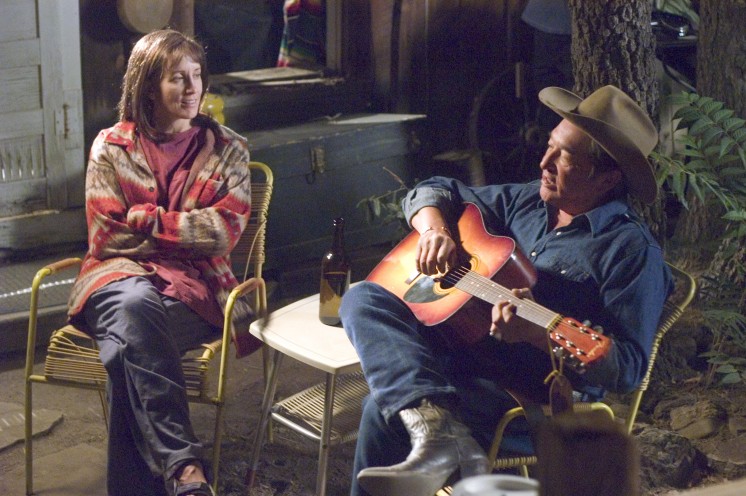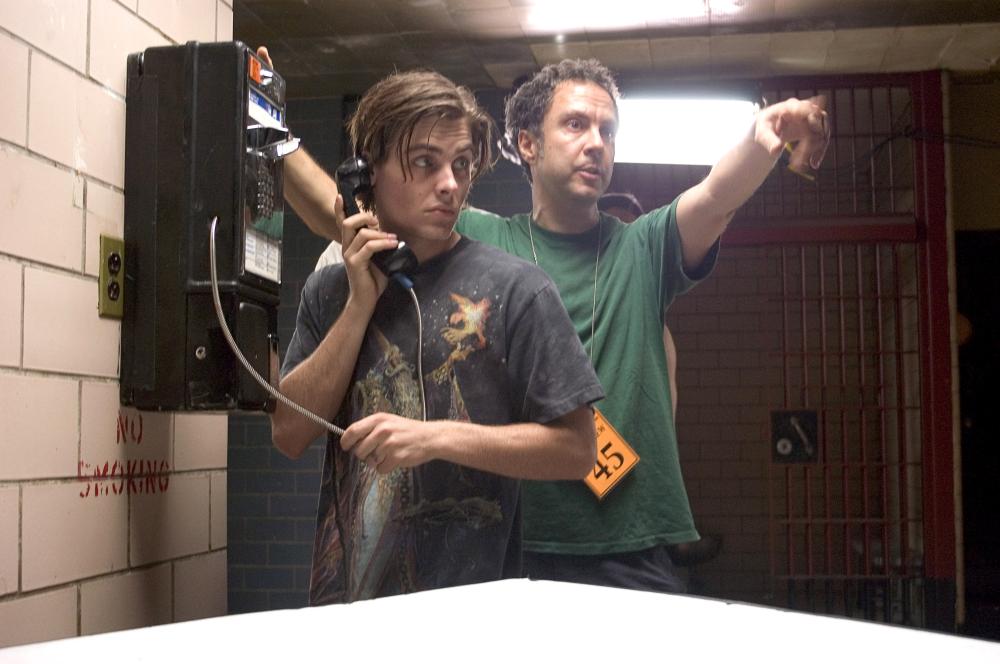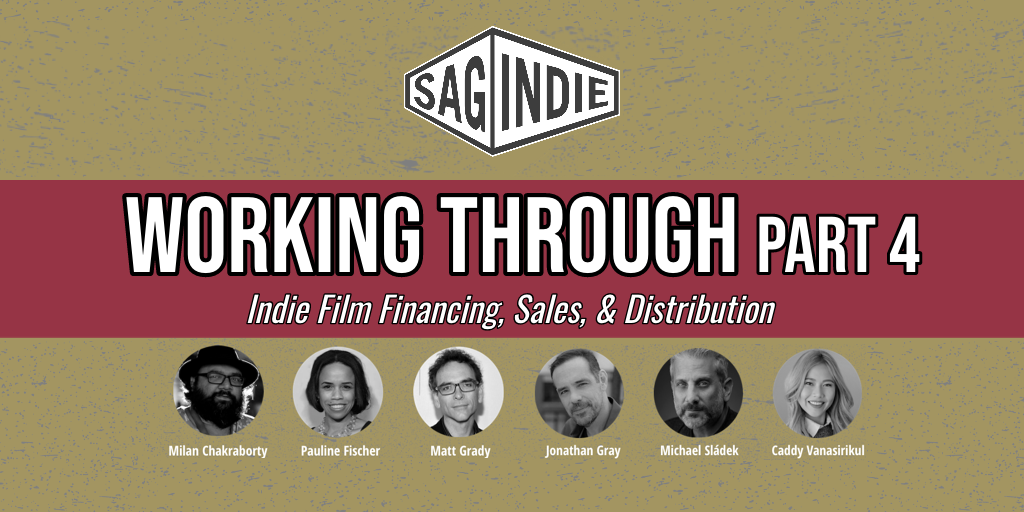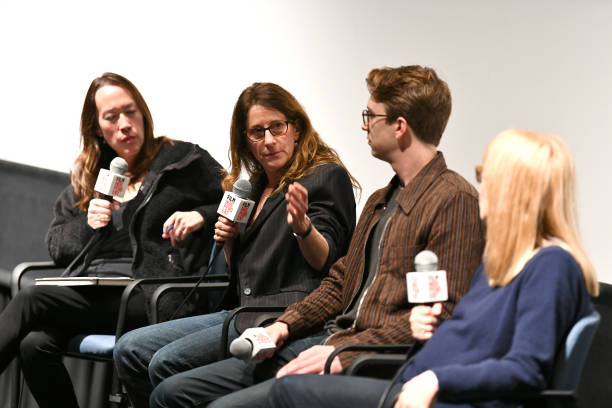As SAGindie celebrates our 20th Anniversary, we’ve opened our archives and unearthed some long-lost features and interviews from years past we thought were worth sharing again. Below is a re-post of one of our archived interviews.
[Originally published in SAGindie Spotlight, December 2005. Ed note: This article has been reprinted from the original 2005 text. Thusly, certain word choices may not reflect today’s standards of transgender representation, sensitivities, and language.]
THE MOTHER OF ALL ROAD TRIPS
An interview with Transamerica writer/director Duncan Tucker
That’s right filmgoers, it’s December, the holiday season. A time for families to get together and watch the latest Harry Potter film, or is it Narnia this year, or is it those aging stars and their ridiculously large family of WB stars? Sounds like it’s time to escape the well-trodden mainstream. Maybe it’s time to rethink what the definition of family means. TRANSAMERICA is the story of a pre-op transsexual and her hustler son on a cross country road trip from New York to Los Angeles. Felicity Huffman (Desperate Housewives) plays Bree, a transgender man who must reconcile with his son before his psychiatrist (Elizabeth Peña, Tortilla Soup) will sign papers to approve his operation to become a woman. Their trip will take them through the heartland and force them to become a family. After a long journey through the film festival circuit, Transamerica is finally hitting the theaters.
SAGINDIE: How did you become a filmmaker?
DUNCAN TUCKER: I never went to film school. I didn’t really know anything about filmmaking, which maybe is my best strength as a filmmaker. I like storytelling, I like music and taking pictures and I like actors. I wanted to put all of those things together. So filmmaking was a no-brainer. I moved to Los Angeles for a few years, read some books and met some people in the industry and learned as much as I could. I did a short film called The Mountain King, which we shot on DV with a crew of four people. I had a lot of success with that short; it was in thirty festivals and got distributed in a short film package called Boys to Men. It was a very primitive effort compared to Transamerica, but at least I felt like I could tell a story after that. I researched and I wrote Transamerica and then spent years – several years getting my heart broken over and over again by people saying that they didn’t want to put the money up… that it wasn’t bankable… didn’t think it would find an audience. And I thought, “Are you kidding? I’d see this movie.” It was like shouldering a boulder up hill. But like they always say, the movie gets made at the right time with the right people. It couldn’t have happened better for us.
What was the inspiration for Transamerica?
DT: I started out wanting to make a quest movie of some kind. I thought, I love the science fiction fantasy books like The Lord of the Rings. But I was like, well, I can’t make The Lord of the Rings. So I thought if I wanted to make a big wild adventure on a budget what would that be? A lot of fantasy quest movies are road movies, and this film is really a lot like The Lord of the Rings when you think about it: My main character Bree and Frodo both have to leave there safe homes, journey across wild and unsafe land, and they need to get rid of a treasure they both don’t want – a ring or a son. And then they come back home changed. Feelings of being a misfit, and having to come of age, I wanted a lead character that needs to grow up and learn to accept themself. And then, by chance, I met a trans woman who told me what was under her skirt, and I didn’t have any idea she was anything other than a genetic girl. You could have knocked me over with a wet noodle. I listened to some of the stories she told me with my mouth hanging open. They were all ultimately hilarious and tragic at the same time. And then it hit me, I mean talk about a big journey you have to make to except yourself and grow up. And then I started researching and out of that research, I discovered this movie.
Was it difficult to make a self-loathing character likable?
DT: I didn’t bother trying to make Bree likable; I just tried to make her honest. She’s a person who had a hard time in life. She has pride and dignity, and she smart, but her emotional IQ is around negative thirteen. I wanted to make her a bit difficult, people who have had hard knocks in life sometimes have to knock right back just to survive. Her problem really is stealth, if you take stealth as a metaphor for non-self acceptance. She has something to hide, something that she doesn’t like about herself, an internalized phobia if you will. In the end she has to change not only her anatomy to become a female, but she really need to become a woman. So the emotional climax of the film is not when she has her surgery but afterward when the walls around her heart which have been protecting her come cracking open.
Why did you decide to cast a woman in this role?
DT: When I did my research with trans women, the thing I notice time and again was how often they did not look like men in dresses. The general perception is exactly opposite to the truth. After two years of hormone therapy, a brow reduction and chin contour on most any man, and it would be hard to tell. I felt it would be dishonest and a mark of common ignorance to cast a man in this role. I felt it would honor where the character was going and not the anchor she was leaving behind.
How did Felicity come onto the project?
DT: I first saw Felicity Huffman off-Broadway in David Mamet’s Cryptogram. She was such a compelling, stunning, intelligent and intense actress that after that I watched her in every television show and movie I could. And when we got our two dollars and fifty cents together to make the movie by begging, borrowing and stealing from friends and family, my producer said we can make the movie on this budget, but anyone you’ve ever heard of before, we can’t afford. We went ahead and called Felicity up and made her our offer and she fortunately said yes, but with one caveat, she had a television pilot she had to shoot in fourteen weeks, and we had to be done by then. And I’m like, Holy crap. So suddenly we were in high speed through pre production and I was thinking, Stupid damn TV pilot, who the hell cares about that, it probably won’t even get picked up. Of course that pilot ended up being Desperate Housewives.
Was it easier to get the other name actors after Felicity was on-board?
DT: Not really. I still had to ask actor by actor. Felicity is definitely an actor’s actor. But all of the actors were my first choice. Graham Greene, Fionnula Flanagan and Elizabeth Peña just signed on working for peanuts on the strength of the material. They just really seemed to respond to it. I felt so honored and happy to have them on-board.
The film has several locations across the country, how did go about securing everything you needed on such a tight budget?
DT: When Felicity signed on we had only eight weeks of pre production, so we had to start that very hour. I had to immediately think of places that I knew we could use. The house in Phoenix, that’s my mom’s house, the house in Dallas where the trans party happens is my college friend’s house. The lake where the two boys go skinny-dipping, that’s a lake across the highway from where I went to college.
Did you run into any problems with the films subject matter in these locations?
DT: In our press kit the producer tells a story of how we had a staging area in a Mormon church. When they asked what the film was about we told the truth, it’s about family. And they’d say, “Oh, that’s nice.” And that’s all they really needed to know. But for the most part, we were in such tiny places that they had never seen a movie shot before. For the most part we were in homes of friends and family.

Did you have enough time to rehearse?
DT: We had six weeks of shooting, but when you take away vacation and travel days we were down to about five weeks. It was very important to me to have enough time with my actors. I like to consider myself an actor’s director. You need to have the time to help the actors discover their best work and to make the characters jump off screen and feel immediate and real and to feel like every single character could have their own separate movie. I’d definitely like to see a movie about Calvin Many Goats or Bree’s mother’s character. That’s what I was going for anyway.
Did you have to do any cuts for the MPAA?
DT: No. I was really worried about that one scene in particular, where Toby discovers Bree’s gender history. When I saw how complete the transformation we were pulling off was and how astounding Felicity Huffman was, I wanted the audience not to forget what she was carrying around. I wanted them to really feel for her. My producers asked me, “Are you sure you really want to do this? Are you certain?” I told them, “This is what we are doing and that’s it.” We did not shoot around it. I refused to. It was very important to make the movie I wanted to make. When we decided to use a prosthetic penis talked to Felicity first to make sure she was okay with it. And she said, “Absolutely.” So we did a call to special effects houses and prop houses in New York to find out the cost of building a prosthetic penis that could urinate. It was quoted to us a price of $20,000, and that was like our entire budget. Fortunately, Felicity had a life like molded latex panty stuffer as part of her actor’s preparation and she wore it to create the bulge. I asked to borrow it and had our prop person drill a hole in it and they put a plastic tube in it, which connected to a hot water bottle, which she held under her arm. We had makeup paint it with her foundation and blush and so on - all the grips were volunteering to pose for the makeup girl. Felicity tried it on in our one little trailer the night we were going to shoot it. She called for me and when I get inside she’s holding it up against her leg in full florescent light and it looked so disturbingly real. It was every bit as good as any $20,000 prop ever would have been. It just shows what you can do for $12.99.
Did it take long to figure out Bree’s makeup?
DT: Felicity had a big hand in creating the makeup for Bree. The first go around she came off with something that was a little too Tammy Faye Bakker and I said, “Too much.” They came up with this great look that was just foundation one shade off. As if she buys her makeup through the Internet and has to guess about her coloring. She’s really not very good at drawing on her lips yet, and she forgets to put foundation on her neck when she does her face. You know, like she’s still learning. The makeup people contoured her bones and her jaw to bring them out more prominently. And besides that it was Felicity’s expressions and her ultra practiced femininity. Head held high, hands folded across her breasts, feet together, boobs out and hands moving deliberately as if underwater. It all just read as wrong.
Explain your working relationship with your DP?
DT: Steve Kazmierski is not someone who I could normally afford on this budget. He told me that with the script I had I wouldn’t have any problem hiring a good crew. When I’m working I love to hear everyone’s ideas, I’m not one of those directors who says do it my way or no way. I want to hear all input and then decide what I like. But Steve always had great ideas about blocking and camera placement. We had stimulating and creative discussions.
You have an interesting closing song, how did you get it?
DT: I went to my agent and I said there is one person who is an icon of self-invention, life force, and family. I asked if we could get the film to Dolly Parton and see if she would let us use a song. So we got it to her office and a week later she said she’d like to write us a song. I told her I wanted something that was like a spiritual that you can snap your fingers to and a melody you can’t get out of your head. And a week later her office called and said she had written a song. I met the Dolly Parton in Detroit for an hour and she sang this song she had wrote for me on the guitar. I’m really proud of that song, I think it’s one of the best she’s ever written.
When did The Weinstein Company come on-board?
DT: We premiered the movie at the film festival in Berlin. We took an un-color-corrected print with us on the plane. We had no advanced screenings or press, we were completely under the radar. The only people who came were local Berliners. We couldn’t drag Hollywood distributors to see it. They thought it was some campy movie I guess. But the Berlin audience was amazing, we had four screenings in big theaters and by the second screening it was totally sold-out and in the third and fourth screenings they were packed in the aisles. We ended up winning an audience jury award, and Variety came out with this rave review, it was wonderful and surprising. I didn’t even know they were there. And suddenly everyone wanted to see it and our sales representative held off showing the film until the Tribeca Film Festival. Bill Macy got Harvey Weinstein to come to a screening instead of a private one. Now, Harvey knows Felicity and he knew that she was in it. He told me that he was waiting twenty minutes for her to come on before he realized that she was playing Bree. We had several distributors make offers on the film but Harvey was very persuasive. They are distributing the movie as they first saw it. They have a smart a creative team there. We couldn’t be happier.
Any words of wisdom for aspiring filmmakers?
DT: Don’t do it. No, I’m kidding. If you care about your characters and your story, that is paramount. You have to tell the story and breathe life into the characters, hear their voices, make it punchy and fast and don’t get bogged down in issues. Keep the love for the people in your stories.
Another story of filmmaker adversity paid off in spades. Transamerica will have a limited theatrical release on December 23rd.
__
Thanks to Duncan for discussing TRANSAMERICA.
If you’re an independent filmmaker or know of an independent film-related topic we should write about, email blogadmin@sagindie.org for consideration.




